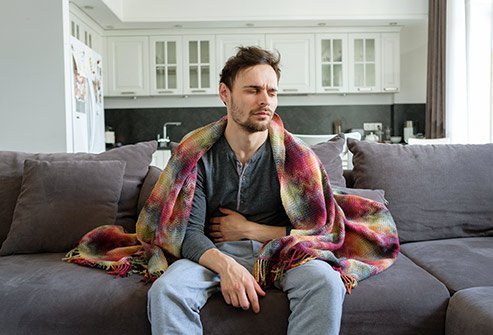Educational Content: This article is for informational purposes only and does not constitute medical advice. Always consult a healthcare provider for diagnosis and treatment.
When Stomach Pain Is and Is Not an Emergency
Medically reviewed by Min Clinic Staff | Updated: January 2026
When is stomach pain not an emergency?

Most stomach pains are harmless. They may be caused by overeating, gas or indigestion. If your pain is short-term, goes away after passing gases or stools and with over-the-counter products (laxative and antacids) or home remedies, there is nothing to worry about.
When is stomach pain an emergency?
If your belly pain is severe, doesn't go away or it keeps coming back, talk to your doctor.
You may have belly pain because of some problem that needs to be treated immediately. You should contact your doctor in an emergency rather than use self-care if you have the following
- Pain accompanied by a fever over 38.3°C or 101°F
- Severe pain, fainting or inability to move
- Pain that starts all over the belly but settles into one area, especially the lower right part of the belly
- Extremely tender-to-the-touch and swollen belly
- Pain lasting for more than a few hours
- Extreme discomfort/pain in the belly
- Unable to keep food down for more than two days
- Continuous nausea, vomiting or diarrhea
- Signs of dehydration, including not passing urine or passing frequent dark-coloured urine and being very thirsty
- Vomiting blood or a black material
- Black or bloody bowel movements
- No bowel movement, especially if you're also vomiting
- Unable to pass gas
- Pain when you pee or need to urinate often
- Pain that seems to come from the testicles
- Continuing symptoms despite a full course of prescription or over-the-counter medications
- Trouble breathing
- Pregnancy
It may be dangerous if you have the following
- Unintentional progressive weight loss
- Change in bowel habits
- Alternating periods of diarrhea and constipation
- Age over 50 years old at onset of belly pain
- Blood in the stool
- Yellow skin and eyes
- Breathlessness
- Family history of abdominal cancer
- Abnormal test results such as anemia (very low red blood cells) or abnormal liver function test results
- New onset of symptoms without an obvious trigger(s)
- Symptoms that increase over time and interfere with daily activities
How does my doctor figure out the cause of stomach pain?
- Your doctor may ask you about your symptom history and examine your abdomen thoroughly. The doctor may make a diagnosis of the possible diseases by the location, origin, cause of symptoms and severity.
- Your doctor may assess your psychological status such as psychosocial abuse or stress, family relationships, anxiety, depression or any trauma that may manifest into a digestive disorder.
- For a further definite diagnosis your doctor may order
- Usual blood work-up to screen the blood cells (anemia) and look for infection
- Serum electrolytes and glucose tests to screen metabolic causes
- Liver function tests, if you have upper right-sided belly pain
- Inflammatory markers
- Urine test to check the urinary tract or for bladder infection
- Stool examination with/without culture to check for worms or parasites and blood in the stool if you are over the age of 50
- Pregnancy test
- Ultrasonography
- X-ray (with or without intravenous dye)
- Helicobacter pylori infection test to rule out stomach ulcers
- Vaginal swab/PAP smear, prostate-specific antigen, etc. in case of pain in the genitals/lower belly
- Endoscopy (a technique to look inside the body) if you are over the age of 50 years old and have weight loss, low blood cell counts, blood in stool and vomiting.
How will my doctor treat my stomach pain?
Your doctor may give you drugs to relieve pain and advise changes in your diet and lifestyle.
- Dietary changes: Your doctor may suggest eliminating wheat, beans, dairy and fruit sugar. The doctor may suggest eating a high-fiber diet.
- You may get antispasmodics, pain relievers, inflammation-relieving medicines or laxatives, antacids, antidiarrheals and/or drugs that inhibit digestive acids (proton pump inhibitors [PPIs]).
- Sometimes, you may get antidepressants or narcotic agents if you have nonorganic abdominal pain.
- Your doctor may follow up with you to
- Reassess treatment after three to six weeks
- Assess your psychosocial status that may be connected to your gut illness
- Examine additional laboratory and radiological tests
- Refer you to a specialist or a pain clinic
